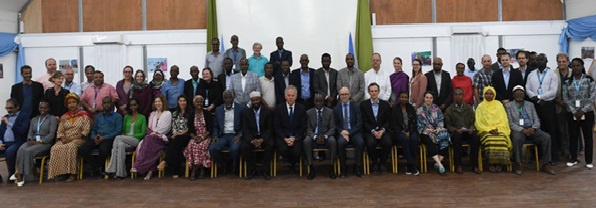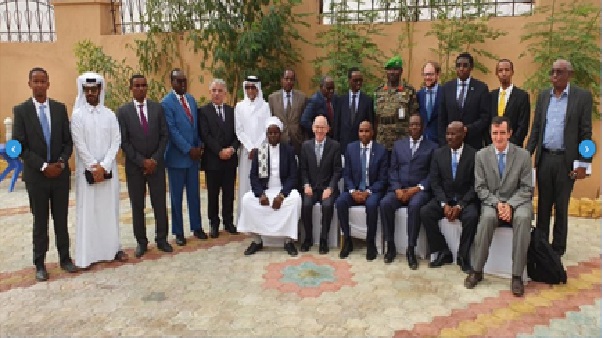By Ibrahim Aden Shire
Over the last three decades, more than a dozen international peace and reconciliation conferences were held for Somalia to end the protracted civil war. Similar number or even more of conferences were also held inside Somalia, some between few individuals and some for major tribes or political alliances. None of these efforts, however, was fruitful. But, all stakeholders of Somali affairs including funders and NGOs as well as the Federal Government are striving to hold more reconciliation conferences without ever asking why all the previous ones never worked. A preparation of another is going on now in Dhusamareb.

The outcome of this conference is already clear for many. In this short article, I will shed light on reasons why previous reconciliations have failed and why Somalia does not need more reconciliation conferences.
First, the word “reconciliation” refers to the restoration of lost unity or living in peace together which has never existed in Somalia. Throughout the Somali history, there have been inter-tribal, inter-clan or sub-clan wars. In fact, Somalis have seen more stability in this century than the previous one and 20th century was more peaceful for Somalis than the 19th century if we use the number of tribal fighting going on at a time as a measure. In the 19th century and early 20th century, there were more conflicts in every area of Somali peninsula than there is today. All tribes were at bad terms descending to sub-sub-clans.
These conflicts were mostly between sub-clans fighting over resources. Each tribe occupied a certain area and it was at war with itself. For example, there had been a famous conflict among ree Diini of Marehan clan, who were at the time only second or third cousins to each other, in 19th century in Himan area while sub-clans of Ali Gari of Dhulbahante had a devastating war and ree Ugas of Mohamed Suber of Ogaden confronted each other in Eid area.
It was rare to find a conflict between major tribes such as Hawiye and Darood or Darood and Isaq. It was always sub-clans which fought each other. Indeed, the deepness of internal feuds among the Somali people was captured by Richard Burton in 1854. In his famous book “First footsteps of East Africa”, he stated that Somalis were always equipped with daggers and spears and they were alert and vigilant at all times guarding themselves no one but other Somali fellows. Therefore, looking for what has never existed and trying to bring it back will only lead to wasted effort.
Secondly, as the term is foreign so as the approach used for these conferences. These conferences are always organised or funded by the international community. Organisers cite success stories in other countries and use copy-paste approach in Somalia without taking cultural differences into account. Although most of the funders and organisers act with good faith, they lack the basic understanding of Somali culture and the complexity of its conflicts. They try to replicate what went well in Rwanda and Sera Leone which share only the continent and the colour of the people with Somalia, for example.

Thirdly, the attendees of these peace and reconciliation conferences do not represent anyone one. Traditional elders and political leaders, who are believed to represent their clans, are always brought together. They discuss, debate, announce that they forgive each other, sign peace agreements and pledge working in harmony. However, these attendees represent no one. Their positions as tribal leaders are mere ceremonial. They do not have the authority to implement whatever is agreed nor do they have the power to reinforce their orders.
Somalis by nature are their own leaders. Their sense of independence is like a supremely uncentralised and fragmented political organisation. A Ugandan sergeant with the British forces fighting the Darwiish went on record as telling his officer: “Somalis, Bwana, they no good: each man his own sultan.” The slightest provocation from one individual of a signatory tribe breaks any peace agreement since his chief neither contains him before he acts nor brings him to justice after offence because he does not have the power to do so. This demonstrates that ending the deeply rooted feuds among the Somali tribes cannot be solved through conferences and signing papers.
Another fundamental issue, which fails any outcome of reconciliation conference, is that some of the politicians who attend these conferences are not honest in what they say and pledge. They come to the forums to secure a position or to reach their political ambitions. When it becomes clear to them, they will not get what they want, they subtly decide to boycott the outcome but they will never publicly admit until they leave the scene of the conference. This is why we see individuals opposing what they supported a few weeks or months before. Take those who opposed the TFG led by Abdulqasim or that led by Abdullahi Yusuf as an example.
In short, all conferences of reconciliation for Somali function have ended in failure because a wrong approach has been used. Somalia is unique in its culture, customs and problems. Therefore, solutions to its problems should be a unique one too. More conferences will only produce the very result we have seen before. A complete paradigm shift is required to bring lasting peace to the country.
Ibrahim Aden Shire
Email: [email protected]
We welcome the submission of all articles for possible publication on WardheerNews.com. WardheerNews will only consider articles sent exclusively. Please email your article today . Opinions expressed in this article are those of the author and do not necessarily reflect the views of WardheerNews.
WardheerNew’s tolerance platform is engaging with diversity of opinion, political ideology and self-expression. Tolerance is a necessary ingredient for creativity and civility.Tolerance fuels tenacity and audacity.
WardheerNews waxay tixgelin gaara siinaysaa maqaaladaha sida gaarka ah loogu soo diro ee aan lagu daabicin goobo kale. Maqaalkani wuxuu ka turjumayaa aragtida Qoraaga loomana fasiran karo tan WardheerNews.
Copyright © 2024 WardheerNews, All rights reserved


